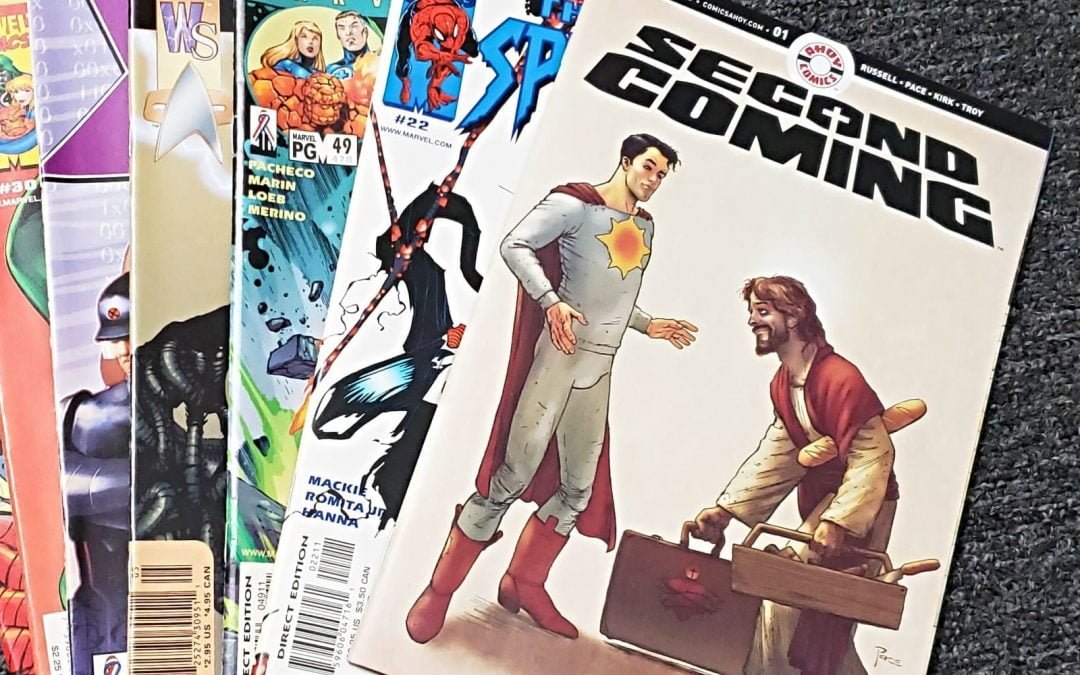This story begins in July 2014.
I was attending my second Comic-Con and went to a panel on the book, “God Is Disappointed in You.”
The writer, Mark Russell, held the panel to give attendees an understanding of the book and why he wrote it.
The book is a synopsis of all the books of the Bible. Russell said he read through the Bible six times and read many books on biblical criticism to come up with his view of what the Bible says.
But another reason for the book’s existence is tied to Russell’s upbringing in the church and the damage done to him by the church. He made it clear that he did not have fond memories of the church from his youth.
That is where I come in.
At that panel, I stood and told Russell that I was sorry for the damage the church did to him. My reason was simple: I believe that we, the church, should own our mistakes and deal with how we have wounded others.
Now I move to this year’s Comic-Con. Russell returns, but with a comic-book series titled “Second Coming” that generated much anger based on knowing nothing of it.
Last year, at Comic-Con, Russell announced he was writing a comic that had Jesus as the central character. He said the comic would deal with Jesus returning to earth to be paired with a superhero.
At the time, I was looking forward to reading what Russell had to say. But we Christians got in the way.
In January, a petition was placed on CitizenGo.org that called “Second Coming” outrageous and blasphemous.
As a result, DC Comics canceled the “Second Coming” series, but it found a home at Ahoy Comics and was released in July.
I read the comic and reached out to Russell, expressing my desire was to ask him questions on his choices in his writing. One question focused on the language used, which is best described as rated R.
I did not know if he would remember me from 2014, but I went to his Twitter page and left him a message to see if he recalled our interaction. He did.
I told him I would be coming to Comic Con this year and would like to speak to him about “Second Coming,” and he agreed to talk to me.
Before I share about my conversation with Russell, here is a brief summary of the first issue of the series.
The story is about God and the problems God has with us, with God trying to get us humans to see things God’s way. But we humans continually did things that were not God’s way, so God ends up having to keep humans from devouring ourselves.
In frustration, God comes back to heaven. Jesus is there, and he tells God that he wants to go to help humans in his “own way.” God tells Jesus that it is OK to get involved in the family business and so Jesus goes to earth.
The comic then shows Jesus on earth and how he gets arrested and crucified. This angers God, so when Jesus reaches heaven after his resurrection, God is not hearing Jesus’ demand to return to earth. God tells Jesus he cannot return until Jesus starts acting like a real god.
The comic moves to what would be present day, and we are introduced to Sunstar, who is much like Superman. Sunstar uses power and violence to get things done.
God sees this and comes to Sunstar to get him to take in Jesus and teach Jesus how to use power. So, Jesus ends up with Sunstar.
What this sets up is the dichotomy of how Sunstar does things and how Jesus does things. The difference is huge. Sunstar beats up the bad guys. Jesus heals them. When asked why, Jesus says they needed it.
In his note at the end, Russell says this: “The huge problems confronting the world today will not be solved by laying down more barbed wire or simply finding new ways to punch people harder than before.
“The ability of armies, empires and the great institutions of force to protect us dwindles by the day. If not Christ, then we need someone like him in our thought experiments to be the voice of other possibilities.”
Basically, what Russell is saying, in my opinion, is what I call Christianity 101: You cannot win through violence and power. You only win through love.
I asked Russell why he made some of the choices he made because they will rankle most of us Christians. He made it clear that he is not doing theology. What he is doing is telling a story.
As our brief interview concluded, I told Russell I wanted to continue the conversation. Having the conversation is of the greatest importance.
The whole affair around the publishing of “Second Coming” speaks much to our problem as believers.
Russell is writing something he feels speaks the gospel to a world in need. We who are the keepers of the gospel think he should be silenced.
Why? Because he is not telling it the way we think it should be told. He is not subscribing to our understanding of the story. He is not using our language, our symbolism and our way of telling.
Many years ago, Kevin Smith wrote and directed a movie titled “Dogma.” It was the story of a lapsed Catholic woman who worked in an abortion clinic and was chosen to go on a journey to keep the universe from unraveling.
One of the things she had to do was find God, who was missing. When that movie came out, Christians got in a huge uproar.
A friend of mine told me that his daughter saw it and called him in tears. She was not crying because of the blasphemy, but because of her appreciation for what her father did as a pastor. Something on the screen spoke to her.
“Second Coming” could speak in a similar way to a new generation of people who have heard our story the way we tell it and rejected it.


